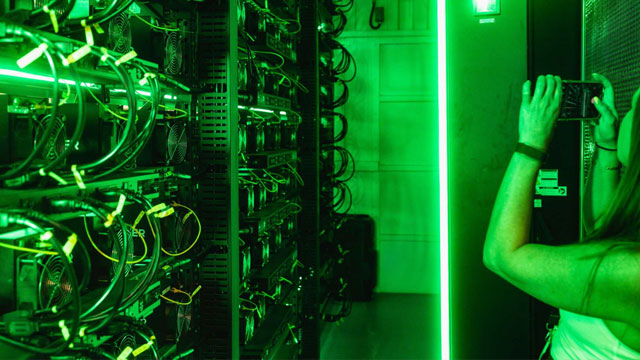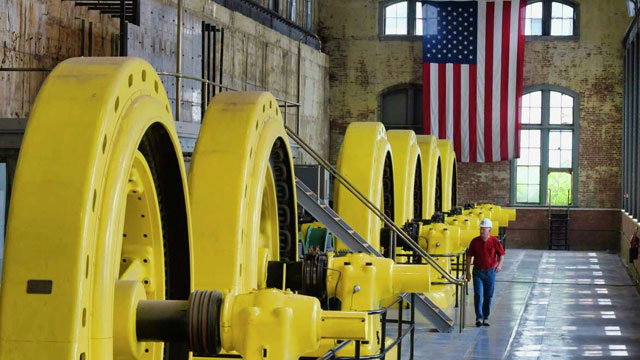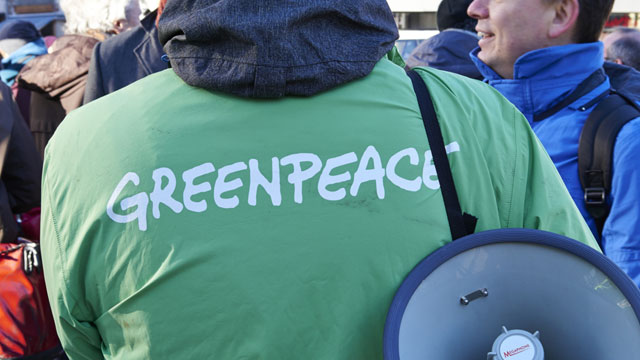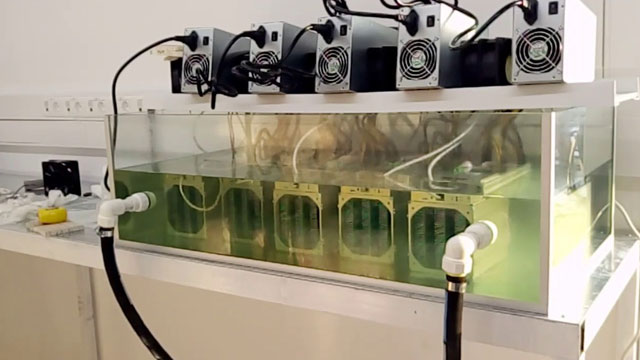Confession Of A Financially Illiterate Narcissist Psychopath*
Over the last decade I’ve seen curiosity and interest grow to the point that in 2020, I co-founded Defieh Strategies to provide educational resources to individuals and small businesses so they can understand how blockchain technology will disrupt the world and decode the news and regulations impacting the crypto industry.
This being said, I am first and foremost a bitcoiner; I do see use cases for other blockchains and have a soft spot for Doge and Shiba Inu but my focus primarily is on how bitcoin and bitcoin-mining can fix some of the world’s problems.
*According to Bank of Canada & Queensland University of Technology
I have been mining since slightly before the first halving; my first (and best) mining rig was a PlayStation 3 and even back then it was powered by clean and renewable hydroelectricity.
Personally, I couldn’t imagine mining with dirty energy; to me, that would be like owning a Tesla and charging it using a diesel-powered generator; it would be defeating the purpose.
This is why every crypto-mining facility I’ve helped bring online has been using renewable energy and has contributed to either minimizing energy waste or reducing greenhouse gas emissions.
My home is self-sufficient and sustainable; its electricity comes from its solar roof and its heat from geothermal energy; in the shed, I have a small Bitcoin mine that utilizes the electricity produced that is not used or stored and is cooled using a geothermal loop.
Meme Magic Is Real: Bitcoin Fixes These!
Because of how long I have been talking to people about Bitcoin (and having a lot of friends and clients in the venture capitalism and tech industries) I have been invited to serve on the advisory board of a few startups in the crypto space and facilitate the development of some really interesting initiatives.
It’s easy when you live in a G20 country to think that problems like the unbanked do not exist here but among the 1.7 billion people worldwide who do not have access to the banking system, over 1 million are Canadians and another 5 million Canadians are underbanked.
First Nations are disproportionately affected by this problem in Canada; it can be because when living in the great white north, the closest bank is a couple of hours away but also historically there’s a lack of trust towards banks.
In 2020, an indigenous man trying to open a bank account for his granddaughter runs the risk of being unjustly arrested on suspicion of fraud like as it happened to Maxwell Johnson at the BMO’s main Vancouver branch.
Not only the Bitcoin network does not discriminate but it can offer access to basic banking services to millions of people who are ostracized from the banking system and left at the mercy of predatory cheque-cashing and pay-day loan companies or governmental financial coercion.
A lot of the philosophical aspects of the technology behind Bitcoin are very compelling to marginalized communities: data sovereignty, sustainable governance, and inclusive community.
Debunking Myths About Bitcoin-Mining
Like many, when Bitcoin-mining started being criticized for its ecological impact, I was cautious and worried but as a good bitcoiner, I did my own research and what I found was the reality of crypto-mining is wildly different than what it’s being portrayed as.
The claim made by Newsweek in 2018 parroting the World Economic Forum that by 2020, Bitcoin mining would consume more power than the world consumed in 2018 has been debunked: the 2020 energy usage of Bitcoin mining is less than 0.1% of the 2018 global energy consumption; which is so insignificant that it represents a rounding error. (Cambridge University, 2021)
76% of Bitcoin miners use renewable energies as part of their mix and 78% of total Bitcoin mining’s energy consumption comes from renewables. (Deutsche Bank & Morgan Stanley, 2021)
Canada as a whole has 400 TWh of hydroelectric capacity. Quebec alone has enough unused hydroelectric clean electricity to operate the entire Bitcoin network which runs on only 129 TWh. (Energy Canada, 2021)
There’s also something to be said about renewable energies; they all have specific needs that require accommodations: for example, the demand for electricity fluctuates during the day or the season; there’s a difference between let’s say a nuclear plant that can run 24/7 and a solar plant which only generates energy during daylight and requires giant batteries to provide the grid electricity overnight.
The True Environmental Impact Of Bitcoin-Mining
One of things I do is helping Bitcoin mining companies find partners because wherever that industry has started operating it has had a beneficial impact on the community whether by saving jobs but also reducing gas emissions, improving the electrical grid, and pushing forward the adoption of renewable and sustainable energy production.
The oldest hydroelectric plant in the world, Mechanicville was almost shut down because its previous owners deemed its profitability to be lacking; it was only saved due to a local bitcoin mining operation purchasing the plant and saving local jobs and continuing to provide the community with affordable renewable energy while being profitable thanks to Bitcoin mining. (Bloomberg, 2021)
After running a pilot project in North Dakota, Exxon Mobil, the US biggest oil and gas company decided to expand to all sites the deployment of self-contained bitcoin mining rigs to reduce their climate footprint; these mining rigs use as a power source gasses that would otherwise be released to burnt in the atmosphere; the pilot revealed that crypto mining could help reduce up to 63% CO2 equivalent emissions of waste/flare gas. (Texas A&M University, 2021)
Texas’ power grid, ERCOT is known for struggling with fluctuating energy prices and sporadic service; by welcoming Bitcoin mining operations, the lone star state has not only seen an influx of companies that could curtail to its large flexible loads framework to help improve the reliability of the grid during high demand periods but also the proliferation of solar energy production facilities which are often built in conjunction with Bitcoin mines. (Business Insider, 2022)
In Congo, the famous Virunga National Park invested massively in building hydroelectric plants so the people living nearby wouldn’t need to poach the park natural resources like burning trees to produce charcoal. As the pandemic had a dramatic impact on tourism the park lost its main source of income; that’s when the park turned to mining Bitcoin to offset the loss of operating budget and keep providing a sanctuary for endangered mountain gorillas. (MIT Technology Review, 2023)
“Bitcoin is the most efficient system in the history of mankind for channelling energy through time and space.” -Michael Saylor
Bitcoiners‘ Actions Speak Louder Than Critics’ Words
In Canada there are countless similar situations that can get yield the same benefits from Bitcoin-mining; we have a massive amount of hydroelectric plants in remote areas that are either wasting energy or being shut down, a lot of them on First Nations land; implementing a Bitcoin mining operation there would allow these plants to remain active keeping jobs in the local community; for First Nations that would allow children the possibility to stay on their ancestral lands as opposed to being forced to be displaced to make a living; it also would improve the grid. The Canadian oil sands have already been exploring the use of Bitcoin-mining to reduce flare gas emissions. In the next few years, this solution is going to expand.
When I see the co-founder of a proof-of-stake crypto company give millions of dollars to an activist group for a negative public relations campaign against proof-of-work mining; I think it’s just noise that has nothing to do with concerns for the environment as these millions could have been used to deploy crypto mining rigs that would help decarbonate oil refineries; instead they’re being spent on superficial hoo-ha that doesn’t do a thing for the planet.
Unfortunately, people listen to these falsehoods and when they tell me mining Bitcoin is superfluous pollution I bring up washing machines: why are people using washing machines when if they cared so much about the environment they could wash their clothes and linens by hand? Just the environmental impact of building these machines is significant, yet people value what these machines do and do not question their usage’s impact on the environment.
The same goes for Bitcoin-mining: people who really care about the environment should all be pushing for the adoption of Bitcoin: according to Scientists For Global Responsibility, the finance industry has a yearly carbon footprint of close to 1,400M tons of greenhouse gases meanwhile Bitcoin which can replace the entire finance industry while doing so much more is only responsible for less than 45M tons of greenhouse gases.
To me, the most effective path to decarbonization runs through Bitcoin-mining.
Water Is The Focus Of My Next Bitcoin-Mining Ventures
The Bitcoin-mining industry is quite vibrant and innovative; there are a couple of very intriguing uses that have grabbed my attention and they all have to do with fixing a growing societal problem while reducing environmental impact which are two things I’m passionate about; so I’m interested in replicating their example.
With the growing cost and shortage of energy, many swimming pools in Europe have lowered or stopped being heated and often require swimmers to wear wetsuits. Using the energy generated by bitcoin-mining might be a sustainable way to heat public swimming pools. Based on pilot projects, 97% of the electricity used to mine bitcoin is transformed into heat and a mining rig can heat a swimming pool to 30C/86F while reducing its energy consumption by 62% and its carbon dioxide emissions. (Data Center Dynamics, 2023)
If water cooling is a great way to deal with the heat generated by bitcoin-mining, immersion cooling using an oil-based dielectric fluid is a way to eliminate water usage altogether while reducing energy usage needed for cooling fans; one of the perks of using a two-phase immersion cooling system is the ability to recycle the heat for power generation. (Business Wire, 2023)





















